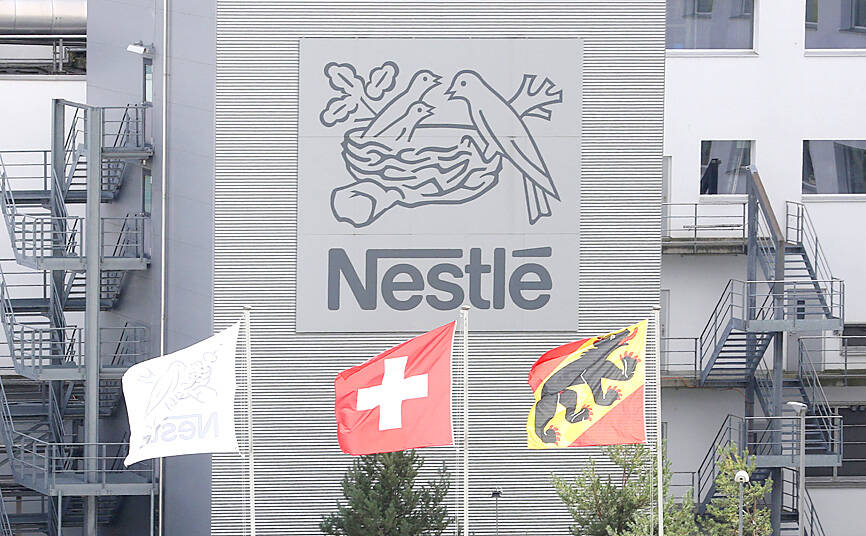Nestle SA has abandoned pledges to make major brands, including KitKat and Perrier, carbon neutral, joining a nascent corporate pushback against programs that let polluters compensate for their own greenhouse gas emissions by investing in efforts to reduce them elsewhere.
The world’s biggest food company joins airline EasyJet PLC and Gucci owner Kering SA in backing away from so-called carbon offsetting as a way to meet net zero emissions targets.
Consumer groups have said the practice is misleading for shoppers and does not always mean emissions are falling.

Photo: Reuters
Nestle is shifting toward in-house programs to reduce greenhouse gas emissions in its operations and supply chain, a spokesperson said.
The Swiss food company also dropped plans to make plant-based meal lines Sweet Earth Foods and Garden Gourmet carbon neutral.
Carbon-offset programs do not really reduce businesses’ impact on the climate, critics say, even though the label does have appeal for well-meaning consumers.
“If you’re a consumer in the supermarket, you have no way to know how much of a carbon neutral claim is from actual emissions reductions and how much is from these dubious carbon-offsetting projects,” said Emma Calvert, a food policy officer at European consumer rights organization BEUC, which wants to ban “carbon neutral” claims on food.
Multinationals are under pressure to help prevent the planet from heating up more than 1.5oC.
The net-zero standard requires companies to set long-term science-based targets to cut all possible emissions before 2050.
While Nestle is abandoning carbon offsets, it still aims to achieve net zero in 2050, planning to reach that through measures often known as “insets.” That includes actions like helping farmers shift to regenerative agriculture, restoring wetlands, protecting habitats for pollinators and planting hedgerows to prevent soil erosion.
However, insets are also problematic. It is hard to check the methodologies that companies use and there are no global verification standards, the NewClimate Institute said.
Those measures could give consumers a false impression of a company’s impact on climate, the group said.
Carbon neutrality claims can play well with consumers as they can assume it means fewer greenhouse gas emissions. A study conducted by a German consumer organization concluded that carbon neutrality claims improve a product’s image even when there is no guarantee that an environmental benefit actually exists.
Greenwashing claims can backfire for companies, too. Danone SA is the target of a US lawsuit over the carbon neutral label on its Evian waters. A Swedish court fined and banned European dairy group Arla Foods from using the term “net zero climate footprint” in the marketing of its products sold in the country. Nestle is facing a legal challenge from a French consumer group over its claim that Nespresso is carbon neutral.
Despite the change in approach, some of Nestle’s brands are still touting their carbon neutral successes. The Web site of vitamin business Garden of Life says it reached that status six months ahead of schedule in 2021.

The Eurovision Song Contest has seen a surge in punter interest at the bookmakers, becoming a major betting event, experts said ahead of last night’s giant glamfest in Basel. “Eurovision has quietly become one of the biggest betting events of the year,” said Tomi Huttunen, senior manager of the Online Computer Finland (OCS) betting and casino platform. Betting sites have long been used to gauge which way voters might be leaning ahead of the world’s biggest televised live music event. However, bookmakers highlight a huge increase in engagement in recent years — and this year in particular. “We’ve already passed 2023’s total activity and

Nvidia Corp CEO Jensen Huang (黃仁勳) today announced that his company has selected "Beitou Shilin" in Taipei for its new Taiwan office, called Nvidia Constellation, putting an end to months of speculation. Industry sources have said that the tech giant has been eyeing the Beitou Shilin Science Park as the site of its new overseas headquarters, and speculated that the new headquarters would be built on two plots of land designated as "T17" and "T18," which span 3.89 hectares in the park. "I think it's time for us to reveal one of the largest products we've ever built," Huang said near the

China yesterday announced anti-dumping duties as high as 74.9 percent on imports of polyoxymethylene (POM) copolymers, a type of engineering plastic, from Taiwan, the US, the EU and Japan. The Chinese Ministry of Commerce’s findings conclude a probe launched in May last year, shortly after the US sharply increased tariffs on Chinese electric vehicles, computer chips and other imports. POM copolymers can partially replace metals such as copper and zinc, and have various applications, including in auto parts, electronics and medical equipment, the Chinese ministry has said. In January, it said initial investigations had determined that dumping was taking place, and implemented preliminary

Intel Corp yesterday reinforced its determination to strengthen its partnerships with Taiwan’s ecosystem partners including original-electronic-manufacturing (OEM) companies such as Hon Hai Precision Industry Co (鴻海精密) and chipmaker United Microelectronics Corp (UMC, 聯電). “Tonight marks a new beginning. We renew our new partnership with Taiwan ecosystem,” Intel new chief executive officer Tan Lip-bu (陳立武) said at a dinner with representatives from the company’s local partners, celebrating the 40th anniversary of the US chip giant’s presence in Taiwan. Tan took the reins at Intel six weeks ago aiming to reform the chipmaker and revive its past glory. This is the first time Tan